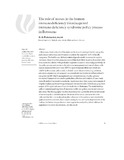Please use this identifier to cite or link to this item:
http://hdl.handle.net/10311/571Full metadata record
| DC Field | Value | Language |
|---|---|---|
| dc.contributor.author | Phaladze, N.A. | - |
| dc.date.accessioned | 2010-07-24T13:10:15Z | - |
| dc.date.available | 2010-07-24T13:10:15Z | - |
| dc.date.issued | 2003 | - |
| dc.identifier.citation | Phaladze, N.A. (2003) The role of nurses in the human immunodeficiency virus/acquired immune deficiency syndrome policy process in Botswana, International Nursing Review, Vol. 50, No. 1, pp. 22-33 | en_US |
| dc.identifier.issn | 0020-8132 (print) | - |
| dc.identifier.issn | 1466-7657 (online) | - |
| dc.identifier.uri | http://hdl.handle.net/10311/571 | - |
| dc.description.abstract | In Botswana, there is dearth of literature on the role of nursing in health-care policy and resource allocation and yet nurses constitute the majority (85%) of health manpower. The health-care delivery system depends mostly on nurses for service provision. There were two main purposes of this study: first, to gather descriptive data from major key players (with particular emphasis on nurses) concerning knowledge of the policy process and resource allocation for management and care of clients with human immunodeficiency virus (HIV)/acquired immune deficiency syndrome (AIDS) in Botswana; and, second, to identify nurse characteristics (e.g. position, education, experience, job category) associated with motivation to influence healthcare policy in HIV/AIDS management and care in Botswana. A policy process conceptual framework was used to guide data collection and analysis. A case-study research method was used to conduct in-depth interviews from a purposive sample of 19 policy makers, and a survey questionnaire was used to collect data from a purposive sample of 95 registered nurses from six study sites in Botswana. The study findings indicate minimal participation of nurses in health-care policy process and resource allocation. The demographic variable of position was a predictor of the involvement of nurses in policy and in budgetary decisions. Both survey and interview data indicated that this minimal participation of nurses in the policy process resulted in implementation problems, thus compromising service provision. Implications of the findings for the nursing profession, nursing practice and policy, which address the importance of nurses’ involvement, are discussed. | en_US |
| dc.language.iso | en | en_US |
| dc.publisher | International Council of Nurses. http://www.ingentaconnect.com/content/bsc/inr;jsessionid=81ud25de419e.alexandra | en_US |
| dc.subject | Health policy | en_US |
| dc.subject | HIV/AIDS | en_US |
| dc.subject | Key players (stakeholder groups) | en_US |
| dc.subject | Policy process | en_US |
| dc.subject | Resource allocation | en_US |
| dc.subject | Role of nurses | en_US |
| dc.title | The role of nurses in the human immunodeficiency virus/acquired immune deficiency syndrome policy process in Botswana | en_US |
| dc.type | Published Article | en_US |
| Appears in Collections: | Research articles (School of Nursing) | |
Files in This Item:
| File | Description | Size | Format | |
|---|---|---|---|---|
| Role of nurses.pdf | 1.81 MB | Adobe PDF |  View/Open |
Items in DSpace are protected by copyright, with all rights reserved, unless otherwise indicated.
